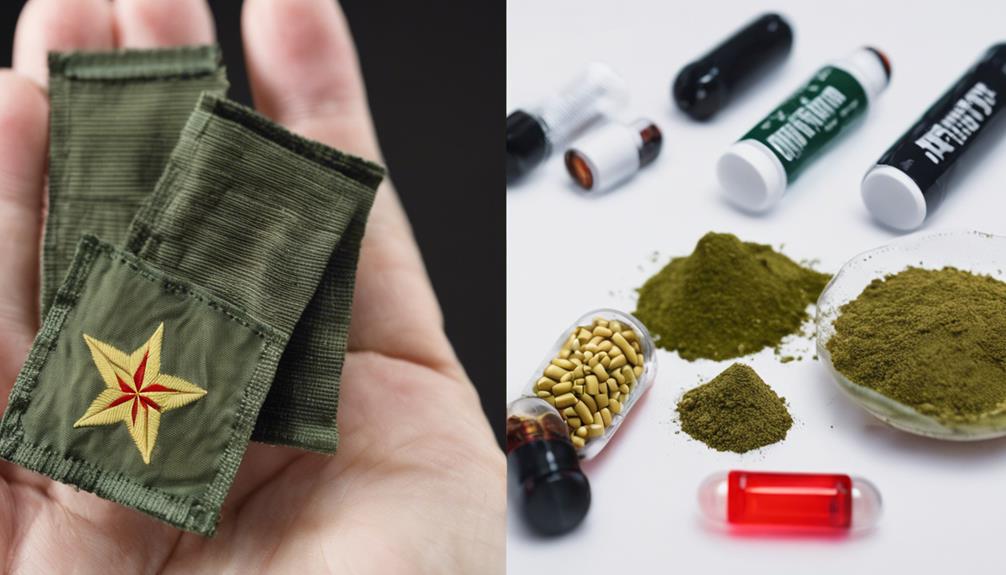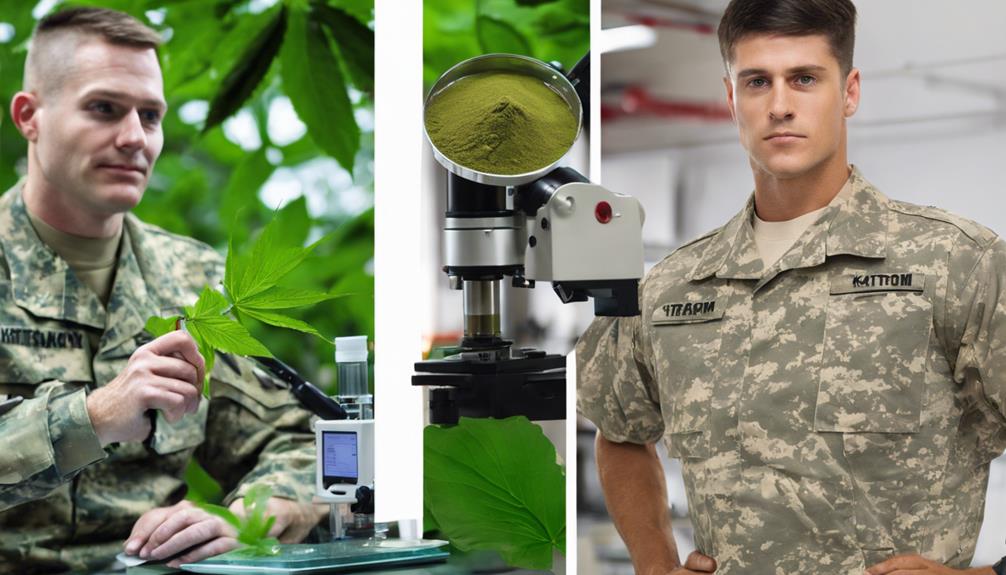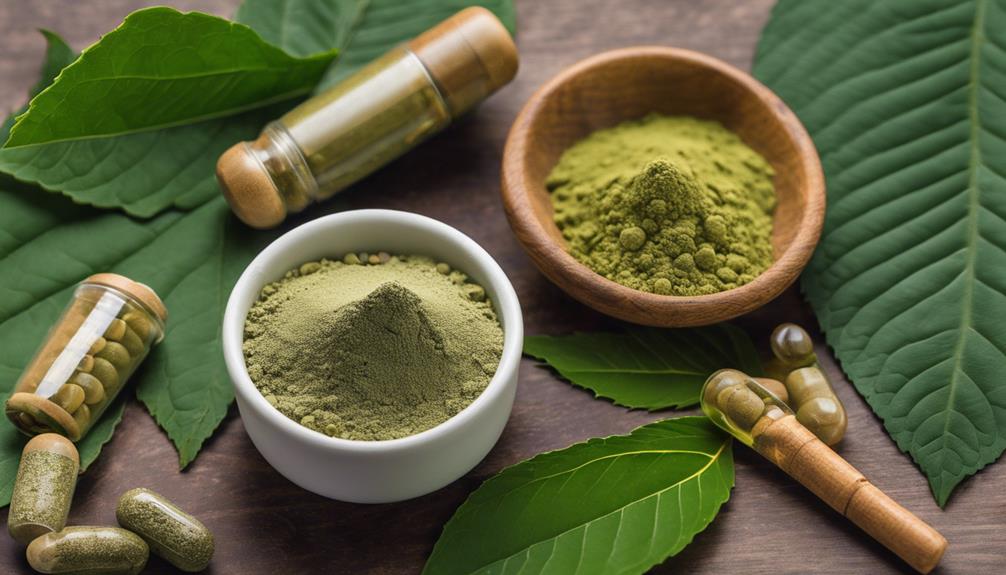Deprecated: mb_convert_encoding(): Handling HTML entities via mbstring is deprecated; use htmlspecialchars, htmlentities, or mb_encode_numericentity/mb_decode_numericentity instead in /home/users/kratomfiles/www/kratomfiles.com/wp-content/plugins/quick-adsense-reloaded/includes/template-functions.php on line 3552
Are you a military personnel worried about the potential consequences of kratom use on your drug test results? While kratom may not show up on a standard Department of Defense drug test, it is still considered a prohibited substance. The Army and Navy have explicitly banned kratom, and although the Marines have not classified it as an unlawful drug, it is still included on the restricted substance list. However, there is a glimmer of hope for future changes if FDA approval is obtained. So, what are the testing methods used in the military, and how does kratom impact drug test results? Let's explore the intricacies of kratom and its implications for military drug testing.
Does Kratom Affect Military Drug Tests?
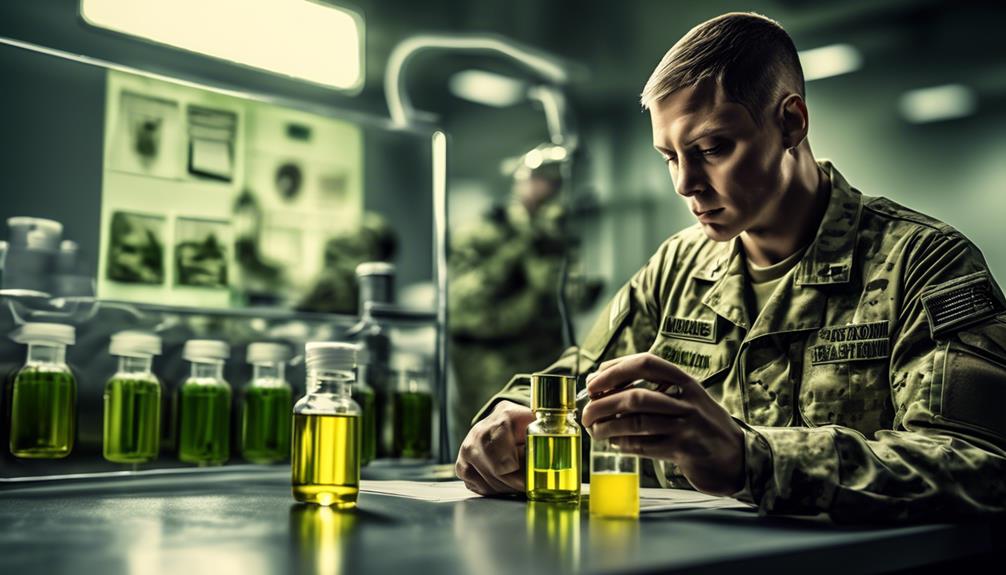
Kratom does not produce a positive result on routine military drug tests, but its use is still prohibited due to safety concerns. Even though kratom is not classified as a controlled substance, it has been added to the list of prohibited substances for military members. This means that active military personnel are prohibited from using kratom, even though it will not show up as a positive result on a routine drug test.
The decision to prohibit kratom use in the military is based on safety concerns. Kratom is often marketed as a dietary supplement and is derived from a plant native to Southeast Asia. However, there have been reports of kratom causing false positives for other controlled substances. Additionally, there are concerns about the potential for kratom to be addictive and for individuals to develop a dependency on the substance.
To address these safety concerns, the military has chosen to prohibit the use of kratom. This is to ensure that military members are not ingesting a potentially addictive product and to prevent the risk of drug dependency. By prohibiting kratom use, the military aims to safeguard the well-being and readiness of its personnel.
It is worth noting that federal agencies are currently considering classifying the active compounds in kratom, mitragynine and 7-hydroxymitragynine, as Schedule I controlled substances. Further research is needed to fully understand the effects of kratom and its potential interactions with military drug tests, particularly hair tests. As of now, however, the use of kratom is strictly prohibited for military members.
Kratom Testing Methods in the Military
In regards to testing for the presence of kratom in the military, various methods are being explored to ensure compliance with the prohibition of kratom use among military personnel. While routine Department of Defense (DoD) drug tests do not detect kratom, military members are still prohibited from using this substance due to safety concerns. However, certain types of drug tests, such as the 10-panel test or blood and urine tests, may be able to detect kratom alkaloids.
To provide a clearer understanding of kratom testing methods, the following table outlines the current situation:
| Kratom Testing Methods in the Military | Routine DoD Drug Test | 10-Panel Test | Blood and Urine Tests |
|---|---|---|---|
| Detects Kratom | No | Yes | Yes |
| Prohibited Substance | Yes | Yes | Yes |
| Potential for False Positive Results | No | Yes | Yes |
It is important to note that the military may develop a means to test for kratom in the future. Therefore, it is advisable for active military personnel to avoid any products containing kratom, as it is considered a prohibited substance. Although kratom is not included in the list of drugs tested in routine DoD drug tests, it is always better to err on the side of caution.
Kratom's Impact on Drug Test Results
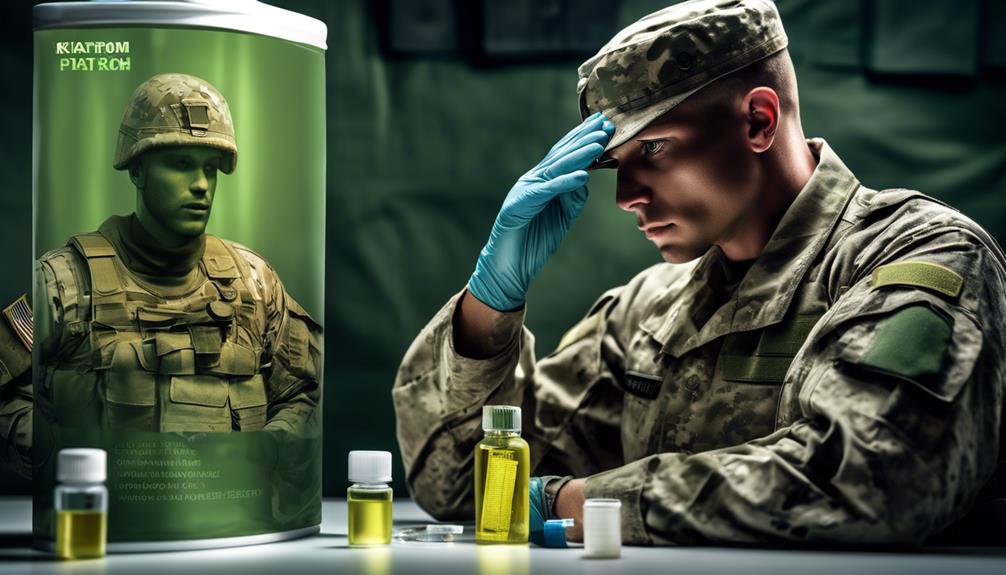
While kratom may not result in a positive drug test within the Department of Defense, understanding its impact on drug test results is crucial. It is important to note that kratom is still considered a prohibited substance for military personnel. Even though it may not show up on a standardized drug test, service members should avoid using any products containing kratom due to safety concerns.
The use of kratom can potentially lead to a false positive for opiates on a urine drug test. This is because certain alkaloids found in kratom can bind to the same receptors in the body as opiates. While this false positive can be concerning, it is important to inform the person administering the test about the use of kratom beforehand to avoid any unnecessary confusion or alarm.
It's worth mentioning that the Food and Drug Administration (FDA) has not approved kratom for any medical use. Therefore, the use of kratom, even if it doesn't result in a positive drug test, is still considered risky and not recommended by the Department of Defense.
Is Kratom Prohibited in the Military?
The use of kratom is strictly prohibited in the military due to safety concerns and the potential for drug dependency and use of other controlled substances. Here are the facts you need to know:
- Kratom has been added to the Operation Supplement Safety list of Department of Defense prohibited substances. This means that military personnel are explicitly forbidden from using kratom.
- Despite not producing a positive result on routine DoD drug tests, military members are still prohibited from using kratom. This is because the military recognizes the potential dangers and risks associated with kratom use.
- Service members should avoid any products containing kratom, as its use is strictly prohibited by the Air Force and Navy. It is important to be aware of the ingredients in dietary supplements and avoid those that contain kratom.
- Possession of kratom by military personnel may result in legal consequences and disciplinary action. The military takes the prohibition of kratom seriously and enforces it to maintain the safety and well-being of its members.
Being a member of the military means adhering to a strict code of conduct and following rules that are in place to protect you and your comrades. The prohibition of kratom is one such rule, designed to ensure the safety and readiness of military personnel. By avoiding the use of kratom and any products containing it, you can continue to fulfill your duties and contribute to the collective effort of the military. Remember, staying away from prohibited substances not only keeps you in compliance with regulations but also helps maintain a strong sense of belonging and camaraderie within the military community.
Are Military Drug Tests for Kratom the Same as Labcorp Drug Tests for Kratom?
Military drug tests for kratom and Labcorp drug tests for kratom may have some similarities, but the specific procedures and criteria used by each organization can differ. It’s important to obtain accurate kratom drug test Labcorp information to understand the specifics of their testing process.
How Long Does Kratom Stay in Your System for a Military Drug Test?
Kratom can stay in your system for up to nine days, which can be detected through a urine test. For a military drug test, Labcorp is known to conduct comprehensive screenings for various substances, including kratom. It’s important to be aware of the potential detection window for kratom in order to be prepared for any drug testing.
Kratom and False Positives in Drug Testing
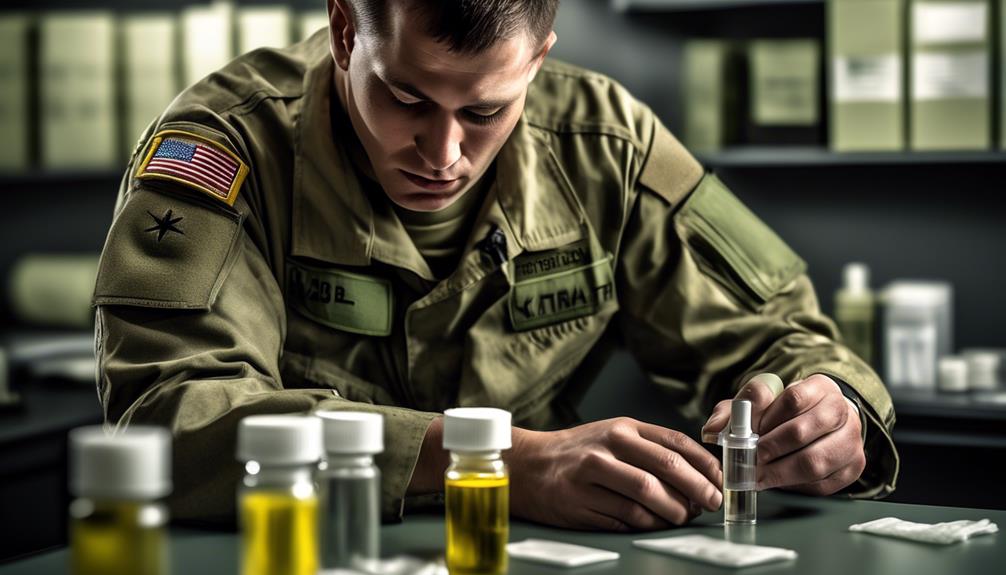
Kratom, although not typically included in routine drug tests, can potentially cause false positives for certain substances. While kratom use will not produce a positive result on routine drug tests conducted by the Department of Defense (DoD), it is important to note that military personnel are still prohibited from using it due to safety concerns and its potential for addiction and use of other controlled substances. Despite being legal as a dietary supplement in the United States, kratom has been added to the Operation Supplement Safety list, making it a prohibited substance for military members.
Although kratom is not usually included in drug tests, it is important to be aware of the possibility of false positives for certain substances. Informing the tester about all drugs and supplements being taken can help avoid such situations. False positives for opiates in kratom drug tests are unlikely, but it is always better to be transparent about your substance use to prevent any misunderstandings.
To provide a visual representation of the substances that can potentially produce a false positive on drug tests, here is a table:
| Substance | Potential for False Positive |
|---|---|
| Opiates | Low |
| Amphetamines | Low-Moderate |
| Benzodiazepines | Low-Moderate |
| Barbiturates | Low-Moderate |
| Methadone | Low |
It is important to note that the potential for false positives may vary depending on individual factors, such as the dosage and frequency of kratom use. While kratom is not typically included in routine drug tests, it is essential to follow the guidelines set by the military and refrain from using prohibited substances.
Frequently Asked Questions
Is Kratom Illegal in the Usmc?
Yes, kratom is illegal in the USMC. Military personnel are prohibited from using kratom due to safety concerns, even though it may not show up on routine drug tests. It's important to understand the risks and potential addiction associated with kratom usage. The USMC has strict regulations in place to ensure the well-being and readiness of its members. It's crucial to adhere to these regulations and explore alternative options for pain management in the military.


